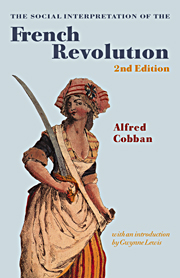Book contents
- Frontmatter
- Contents
- PREFACE
- KEY TO REFERENCES
- INTRODUCTION TO THE SECOND EDITION BY GWYNNE LEWIS
- I THE PRESENT STATE OF HISTORY
- II HISTORY AND SOCIOLOGY
- III THE PROBLEM OF SOCIAL HISTORY
- IV THE MEANING OF FEUDALISM
- V THE ATTACK ON SEIGNIORIAL RIGHTS
- VI WHO WERE THE REVOLUTIONARY BOURGEOIS?
- VII ECONOMIC CONSEQUENCES OF THE REVOLUTION
- VIII A BOURGEOISIE OF LANDOWNERS
- IX COUNTRY AGAINST TOWN
- X SOCIAL CLEAVAGES AMONG THE PEASANTRY
- XI THE SANS-CULOTTES
- XII A REVOLUTION OF THE PROPERTIED CLASSES
- XIII POOR AGAINST RICH
- XIV CONCLUSION
- INDEX
XII - A REVOLUTION OF THE PROPERTIED CLASSES
Published online by Cambridge University Press: 05 June 2012
- Frontmatter
- Contents
- PREFACE
- KEY TO REFERENCES
- INTRODUCTION TO THE SECOND EDITION BY GWYNNE LEWIS
- I THE PRESENT STATE OF HISTORY
- II HISTORY AND SOCIOLOGY
- III THE PROBLEM OF SOCIAL HISTORY
- IV THE MEANING OF FEUDALISM
- V THE ATTACK ON SEIGNIORIAL RIGHTS
- VI WHO WERE THE REVOLUTIONARY BOURGEOIS?
- VII ECONOMIC CONSEQUENCES OF THE REVOLUTION
- VIII A BOURGEOISIE OF LANDOWNERS
- IX COUNTRY AGAINST TOWN
- X SOCIAL CLEAVAGES AMONG THE PEASANTRY
- XI THE SANS-CULOTTES
- XII A REVOLUTION OF THE PROPERTIED CLASSES
- XIII POOR AGAINST RICH
- XIV CONCLUSION
- INDEX
Summary
The attention of general revolutionary historians I has all along been directed primarily to political conflicts. This is not unjustifiable, because those who guided the revolution in Paris, and whose rivalries make up its history, were politicians. By and large they all shared the same basic economic and social ideas. Once the struggle against the privileges of the noblesse was over, in 1789, the revolution became a political conflict, waged for the government of France. The question is whether there was a class conflict beneath this.
There is no sign, it has been said, of such a conflict in the cahiers of 1789. This may mean that there was no such conflict, or that evidence of it has not been found, and if it has not been found this may be because it has not been looked for. I have already suggested that the evidence for agrarian social conflicts was not far to seek. Nineteenth-century ‘bourgeois’ historians, imbedded in the theory of political democracy, were not likely to detect a conflict of economic interests within the ranks of the ‘people’. More recently, historians with a stronger economic interest have rightly refused to see the class divisions of modern times in the pre-industrial society of eighteenth-century France. Also, the natural tendency is to look for evidence of social conflict primarily in the form of movements from below.
- Type
- Chapter
- Information
- The Social Interpretation of the French Revolution , pp. 132 - 144Publisher: Cambridge University PressPrint publication year: 1999



